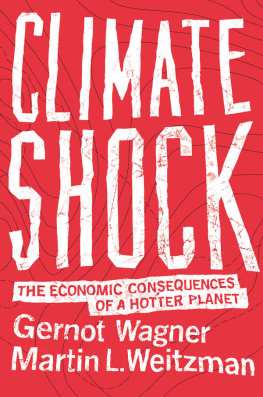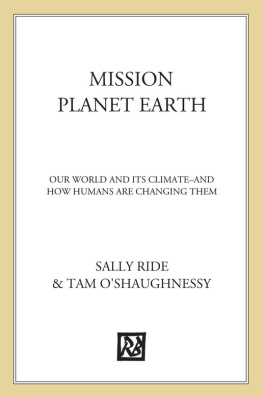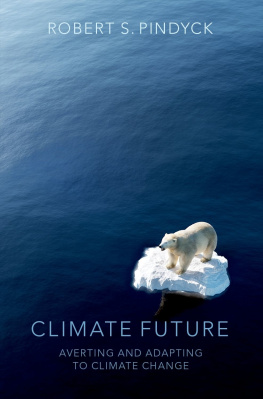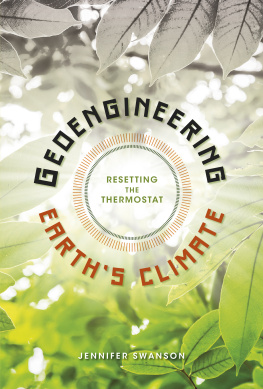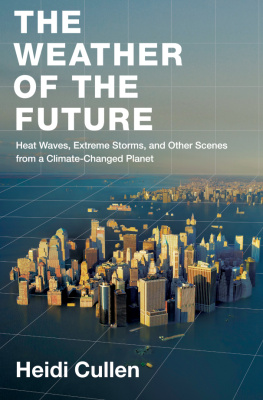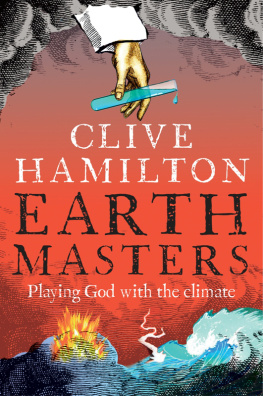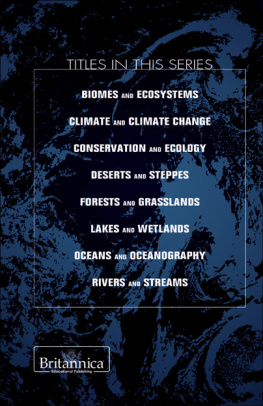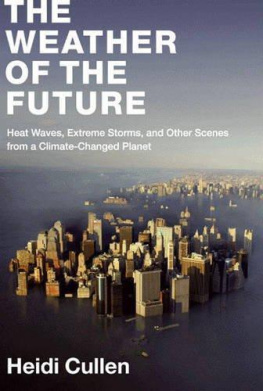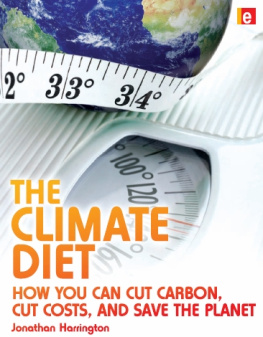Climate Shock

CLIMATE SHOCK
THE ECONOMIC CONSEQUENCES OF A HOTTER PLANET
Gernot Wagner
Martin L. Weitzman
PRINCETON UNIVERSITY PRESS
PRINCETON AND OXFORD
Copyright 2015 by Princeton University Press
Published by Princeton University Press, 41 William Street, Princeton, New Jersey 08540
In the United Kingdom: Princeton University Press, 6 Oxford Street, Woodstock, Oxfordshire OX20 1TW
press.princeton.edu
All Rights Reserved
Library of Congress Cataloging-in-Publication Data
Wagner, Gernot, 1980
Climate shock : the economic consequences of a hotter planet / Gernot Wagner and Martin L. Weitzman.
pages cm
Includes bibliographical references and index.
ISBN 978-0-691-15947-8 (hardcover : alk. paper) 1. Climatic changes
Economic aspects. I. Weitzman, Martin L., 1942II. Title.
QC903.W34 2015
363.73874dc23 2014028540
British Library Cataloging-in-Publication Data is available
This book has been composed in Sabon Next LT Pro, DINPro
Printed on acid-free paper.
Printed in the United States of America
1 3 5 7 9 10 8 6 4 2
To Siri and Jennifer

Contents

Preface

Pop Quiz
Do you think climate change is an urgent problem?
Do you think getting the world off fossil fuels is difficult?
If you answered Yes to both of these questions, welcome. Youll nod along, on occasion even cheer, while reading this book. Youll feel reaffirmed.
You are also in the minority. The vast majority of people answer Yes to one or the other question, but not both.
If you answered Yes only to the first question, you probably think of yourself as a committed environmentalist. You may think climate change is the issue facing society. Its bad. Its worse than most of us think. Its hitting home already, and it will strike us with full force. We should be pulling out all the stops: solar panels, bike lanes, the whole lot.
Youre right, in part. Climate change is an urgent problem. But youre fooling yourself if you think getting off fossil fuels will be simple. It will be one of the most difficult challenges modern civilization has ever faced, and it will require the most sustained, well-managed, globally cooperative effort the human species has ever mounted.
If you answered Yes only to the second question, chances are you dont think climate change is the defining problem of our generation. That doesnt necessarily mean youre a skeptic or denier of the underlying scientific evidence; you may still think global warming is worthy of our attention. But realism dictates that we cant stop life as we know it to mitigate a problem thatll take decades or centuries to show its full force. Look, some people are suffering right now because of lack of energy. And whatever the United States, Europe, or other high emitters do to rein in their energy consumption will be nullified by China, India, and the rest catching up with the rich worlds standard of living. You know there are trade-offs. You also know that solar panels and bike lanes alone wont do.
You, too, are right, but none of that makes climate change any less of a problem. The long lead time for solutions and the complex global web of players are precisely why we must act decisively, today.

If you are an economist, chances are you answered Yes to the second question. all but prescribe the stance of the realist. After all, economists live and breathe trade-offs. Your love for your children may go beyond anything in this world, but as economists we are obligated to say that, strictly speaking, its not infinite. As a parent, you may invest enormous sums of money and time into your children, but you, too, face trade-offs: between doing your day job and reading bedtime stories, between indulging now and teaching for later.
Trade-offs are particularly relevant on an average, national, or global level. And they are perhaps nowhere more apparent on the planetary scale than in the case of climate change. Its the ultimate battle of growth versus the environment. Stronger climate policy now implies higher, immediate economic costs. Coal-fired power plants will become obsolete sooner or wont be built in the first place. That comes with costs, for coal plant owners and electricity consumers alike. The big trade-off question then is how these costs compare to the benefits of action, both because of lower carbon pollution and because of economic returns from investing in cleaner, leaner technologies today.
Economists often cast themselves as the rational arbiters in the middle of the debate. Our air is worse now than it was during the Stone Age, but life expectancy is a lot higher, too. Sea levels are rising, threatening hundreds of millions of lives and livelihoods, but societies have moved cities before. Getting off fossil fuels will be tough, but human ingenuitytechnological changewill surely save the day once again. Life will be different, but whos to say it will be worse? Markets have given us longer lives and untold riches. Let properly guided market forces do their magic.
Theres a lot to be said for that logic. But the operative words are properly guided. What precisely are the costs of unabated climate change? Whats known, whats unknown, whats unknowable? And where does what we dont know lead us?
That last question is the key one: Most everything we know tells us climate change is bad. Most everything we dont know tells us its probably much worse.
Bad or worse doesnt mean hopeless. In fact, almost every prediction in this book is prefaced by a version of the words unless we act. We dont venture predictions only to see them become true. We talk about where unfettered economic forces may lead in order to guide them in a more productive, better direction. And guide we can. In many ways, putting a proper price on carbon isnt a question of if, its a question of when.
Climate Shock

CHAPTER 1

911
T HANK RUSSIAN POLICE CORRUPTION for footage that eluded NASA and every other space agency. On February 15, 2013, an asteroid as wide as 20 meters (66 feet) above the Russian city of Chelyabinsk during the morning commute hours, causing a blast brighter than the sun. It didnt take long for some spectacular videos to appear online, mostly from dashboard cameras many Russian drivers have to protect themselves against the whims of traffic cops. The blast injured 1,500, most because of glass shattered by the explosion. It was a sobering wakeup call for space agencies to ramp up their asteroid detection and defense capabilities.
The money for such efforts is perennially in short supply. But the technical means are there, or at least they could be. A U.S. National Academy study estimates it would take ten years and around to launch a test to deflect an asteroid bound to hit Earth. It may not be as glamorous as sending a man to the moon within the decade, but it may be at least as important.
While the Chelyabinsk asteroid would have been too small to deflect, it would have still been nice to know about it in advance. The chance of a larger asteroid hitting us is small, but its there. Educated guesses put it as a , killing the dinosaurs.

